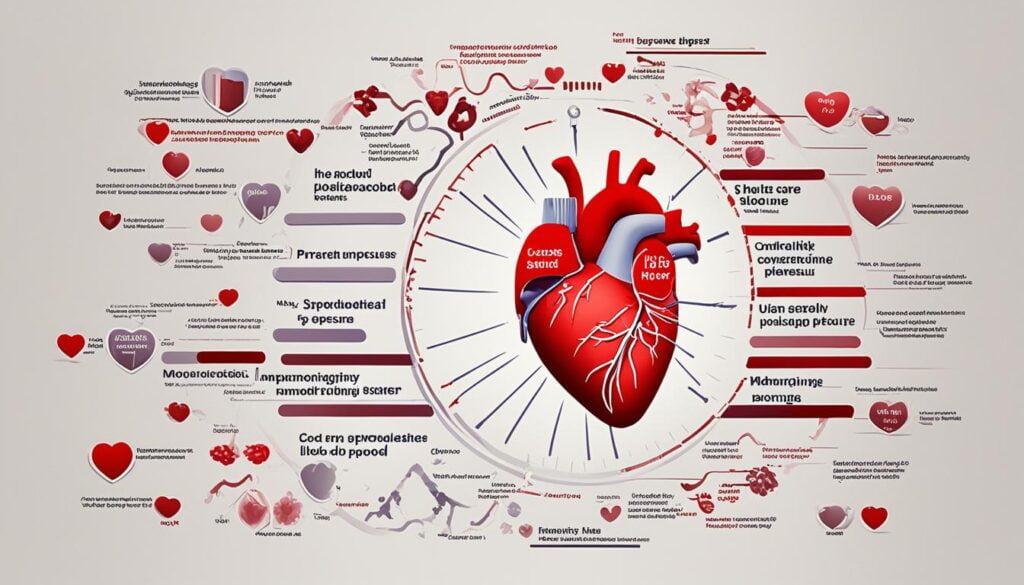Heart disease is not just the leading cause of death; it’s also a major contributor to other health issues. Under the topic of “How Heart Disease Causes Major Complications,” it’s important to understand that the effects of heart disease go much deeper than just affecting the heart. It creates health complications that extend beyond the cardiovascular system, leading to a range of problems that everyone needs to be aware of.
The consequences of heart disease range from sudden emergencies to long-lasting harm. Lifestyle and genes play big roles in these risks. Early recognition of heart disease symptoms is key.
Initiating proactive measures early can effectively prevent severe complications related to heart disease. Understanding the dangers is crucial to fighting heart disease. This helps minimize the serious health consequences that many people experience.
Key Takeaways
- Heart disease affects health in multiple systemic ways, leading to serious complications that can impact quality of life.
- Awareness and early detection of symptoms play critical roles in preventing complications from heart disease.
- Chronic complications in heart disease require diligent management to secure better health outcomes.
- Implementing lifestyle changes and undergoing timely medical response can reduce the risks of advanced complications of heart disease.
- Understanding the pathophysiology and progression of heart disease is pivotal in developing effective strategies to prevent heart disease problems.
Understanding the Fundamentals of Coronary Artery Disease
Coronary artery disease (CAD) is a leading cause of heart disease and demands significant attention. This occurs when the coronary arteries become narrowed or blocked. The arteries transport blood that is rich in oxygen to the heart. Plaques formed by cholesterol have the potential to obstruct blood vessels, disrupting the flow of blood. Various health issues can arise as a result of this.
What is Coronary Artery Disease (CAD)?
CAD, in simple terms, means blockages in the heart’s arteries. It leads to reduced blood flow. These blockages come from a process called atherosclerosis, where plaques gather in arteries. This makes the passages narrow or blocked. It’s a primary cause of CAD and can result in heart attacks or strokes if not treated.
Risk Factors Contributing to CAD
There are numerous risk factors associated with CAD that contribute to its development. Certain factors, like age and family history, are beyond your control. Nevertheless, you can handle numerous other tasks. Managing CAD risks requires addressing factors such as
- Family history of heart disease
- High blood pressure
- Elevated cholesterol levels
- Diabetes
- Obesity
- Smoking
- Sedentary lifestyle
Recognizing the Symptoms of CAD
Understanding the initial symptoms of CAD can assist in receiving prompt treatment, resulting in improved health outcomes. Common symptoms of this condition may include chest pain or angina, shortness of breath, fatigue, and heart palpitations. It’s crucial to keep in mind that symptoms can differ. It is possible that individuals may not experience any symptoms until the disease has advanced.
| Symptom | Description | Typical Onset |
|---|---|---|
| Chest Pain (Angina) | Discomfort or pressure in the chest | During physical activity or stress |
| Shortness of Breath | Difficulty breathing, especially during exertion | Varies, often with physical effort |
| Fatigue | Excessive tiredness | May appear gradually |
| Heart Palpitations | Irregular heartbeats | Can occur spontaneously |
Understanding coronary artery disease is essential for effectively managing its risks. Regular health checks are crucial. Early detection of CAD allows for timely treatment to maintain a healthy heart.
High Blood Pressure: A Silent Killer and its Role in Heart Disease
Understanding the significance of elevated blood pressure on heart health is crucial. It can often go unnoticed, silently causing damage to your heart. High blood pressure significantly contributes to heart issues. Managing it effectively is crucial.

How High Blood Pressure Damages Arteries
Hypertension gradually damages the arteries, impacting the flow of oxygen and nutrients. The connection between hypertension and heart disease is evident. The long-term effects of high blood pressure can have a significant impact on your health. Now, let’s look into how it impacts heart health.
| High Blood Pressure | Impact on Arterial Health | Long-term Heart Health Risks |
|---|---|---|
| Elevated Systolic and Diastolic Readings | Endothelial Dysfunction | Increased Risk of Coronary Artery Disease |
| Chronic Hypertension | Arterial Stiffening | Left Ventricular Hypertrophy |
| Uncontrolled Blood Pressure | Microvascular Damage | Congestive Heart Failure |
| Persistent Vasoconstriction | Formation of Aneurysms | Cardiac Arrhythmias |
Cholesterol and Heart Disease: Understanding the Connection
Studying how cholesterol and heart disease are linked is key to heart health. High LDL cholesterol, or “bad cholesterol,” greatly affects heart health. It leads to plaque buildup in the arteries, which can block blood flow and increase the risk of heart disease.
The Dangers of High LDL Cholesterol
High LDL cholesterol has a significant impact on the health of the heart. High levels of cholesterol can lead to the hardening and narrowing of arteries. Atherosclerosis, a condition that arises from high cholesterol levels, highlights the associated risks.
The Role of Diet in Managing Cholesterol Levels
It is essential to make wise food choices to maintain healthy cholesterol levels and lower the risk of heart disease. Gaining insight into how diet affects cholesterol levels can provide valuable information for making informed choices. Opting for a diet that is low in saturated and trans fats, while also increasing fiber intake, can prove to help maintain healthy cholesterol levels.
| Food Type | Impact on LDL Cholesterol | Dietary Recommendations |
|---|---|---|
| Saturated Fats | Increases LDL levels | Limit intake (e.g., fatty meats, full-fat dairy products) |
| Trans Fats | Increases LDL levels | Avoid industrially-produced trans fats |
| Fibrous Foods | Can reduce LDL levels | Consume more (e.g., fruits, vegetables, whole grains) |
| Omega-3 Fatty Acids | Improves heart health | Increase intake (e.g., fish, flaxseed, walnuts) |
Key Complications from Cardiac Issues
Heart disease has far-reaching complications that extend beyond the heart itself. They contribute to a range of health issues that negatively impact overall well-being. The human body is interconnected, therefore, the effects of heart illness on other organs can result in a variety of health problems. These issues require significant medical attention and care.
Below is a cardiac complications overview. It covers the common complications seen in people with heart disease. It shows why finding and managing these issues early is crucial.
| Complication | Description | Potential Impact |
|---|---|---|
| Heart Failure | A condition where the heart can’t pump blood effectively. | Can result in fatigue, shortness of breath, and fluid retention. |
| Arrhythmia | Irregular heartbeat, either too fast or too slow. | May cause palpitations, dizziness, and, in serious cases, sudden cardiac arrest. |
| Heart Attack | A blockage of blood flow to the heart muscle. | Can damage heart tissue, affecting its ability to function. |
| Stroke | Disruption of blood supply to the brain. | May lead to permanent neurological damage or disability. |
| Peripheral Artery Disease (PAD) | Narrowing of blood vessels outside the heart, usually in the legs. | Can cause pain, mobility problems, and increase the risk of infection. |
| Kidney Disease | Impaired kidney function is due to decreased blood flow. | Can progress to kidney failure, necessitating dialysis or a transplant. |
| Vascular Damage | Damage to blood vessels throughout the body. | It compromises blood circulation, which can affect many organs and tissues. |
Understanding these complications is essential for individuals who are at risk of or are currently living with heart disease. The health of your heart and your overall body are closely connected. By taking proactive steps to maintain heart health, you can effectively reduce the risk of developing serious health complications. Make sure you receive the necessary care if you or someone you know has heart disease. This will effectively manage and potentially prevent additional cardiac issues.
Preventing Complications from Heart Disease Through Lifestyle Choices
Smart lifestyle choices can lower heart disease risks. A heart-healthy lifestyle includes a good diet, exercise, and taking medicine when needed.
The Importance of a Healthy Diet and Exercise
Proper diet and regular exercise are crucial for effectively managing heart disease. Choosing foods that are low in sodium and unhealthy fats, while being rich in fruits, vegetables, whole grains, and lean meats, is essential. Regular exercise is beneficial for your heart, as it improves circulation and aids in weight loss.
Proper nutrition and regular exercise are essential for maintaining a healthy heart. This results in living a longer, healthier life.
| Dietary Component | Benefits | Recommended Foods |
|---|---|---|
| Fruits and Vegetables | Rich in vitamins, minerals, and fiber; low in calories | Leafy greens, berries, apples, and oranges |
| Whole Grains | High fiber content; supports healthy digestion | Whole-wheat bread, brown rice, quinoa, and oatmeal |
| Lean Proteins | It sustains muscle health; low in unhealthy fats | Grilled chicken, fish, legumes, and tofu |
| Healthy Fats | Supports good cholesterol levels | Avocado, nuts, seeds, and olive oil |
Medications and Their Role in Preventing Heart Complications
Medicines are key in managing heart disease. Drugs like statins and ACE inhibitors help with cholesterol and blood pressure. It’s vital to follow your doctor’s advice and know how your medicines help. Along with lifestyle changes, these drugs protect against heart disease.
Preventing heart disease is all about being proactive. Choosing a healthy lifestyle and understanding medication options can greatly enhance life quality. Together, these steps create a comprehensive plan for heart health, allowing you to enjoy a vibrant life.
Medical Interventions for Treating Heart Complications
Exploring heart health is key. It’s vital to note the progress in advancements in heart disease treatment. The last few years have seen a big change in how we deal with heart complications.
Advancements in Heart Disease Treatment
We have made significant advancements in the field of medical interventions for heart complications. Now, there are numerous innovative procedures available to cater to various requirements. Advanced imaging and new drugs are having a significant impact. They have a positive impact on people’s lives, offering hope and improving their quality of life.

Cardiac catheterization and angioplasty serve as excellent examples. They have become more discreet and are now widely used. These methods have truly changed the way we handle blocked arteries, particularly when a stent is present. They greatly reduce the need for long surgeries and allow for a quicker recovery for people in general..
Surgical Options and Their Effectiveness
However, some heart issues still need surgery. Surgical procedures for treating heart conditions like CABG are still important for severe cases. Procedures to fix or replace heart valves are also critical. They save the lives of people with valve problems.
Here’s a quick look at how well different heart treatments work:
| Treatment Type | Procedure | Success Rate | Average Recovery Time | Notes |
|---|---|---|---|---|
| Minimally Invasive | Angioplasty with Stenting | High | Several Days to Weeks | Ideal for patients with less extensive blockages. |
| Surgical | Coronary Artery Bypass Grafting (CABG) | High | 6-12 Weeks | Recommended for multiple or complex artery blockages. |
| Surgical | Heart Valve Repair/Replacement | Varies | Several Weeks to Months | Dependent on the type of valve issue and the patient’s overall health. |
| Minimally Invasive | Cardiac Catheterization | Moderate to High | 2-3 Days | Used for diagnostic purposes and some treatment applications. |
The best treatment depends on many things, including the heart problem you have. Also, advice from a good doctor matters a lot. Always talk about the risks and benefits with your doctor to choose the best plan for your heart.
How Heart Disease Affects Health: The Role of Chronic Conditions
Understanding the impact of heart disease involves recognizing its connection to other chronic conditions. Heart disease and other health problems frequently go hand in hand. Caring for individuals and the responsibilities of healthcare providers can be quite complex.
Heart disease is often associated with several chronic illnesses. There is a wide range of health concerns, including metabolic issues and respiratory difficulties. As an illustration, diabetes can increase the likelihood of developing heart disease. This is achieved by contributing to the accumulation of plaque in the arteries and increasing blood pressure. These concerns may contribute to cardiovascular issues.
In addition, individuals with heart disease may also experience other chronic conditions, such as COPD, which can hurt lung function. This can put a strain on the heart, potentially resulting in heart failure. Heart issues are frequently associated with kidney disease. It places an additional strain on the heart, requiring meticulous treatment plans.
Managing these conditions together can lower risks and improve life quality.
It’s important to take into account all health concerns that an individual may have, rather than just concentrating on heart disease. The monitoring and treatment of these additional conditions may have a significant impact on a person’s well-being. It emphasizes how crucial it is to give each person individualized care. Heart disease greatly affects one’s overall health. Care must, therefore, be inclusive and complete.
The Pathophysiology Behind Major Risks of Heart Disease
Exploring the pathophysiology of heart disease risks reveals the intricate nature of this condition. Gaining knowledge about the biology of heart disease enables us to better manage and potentially even avoid it. A complex interplay of various cell and molecular activities that ultimately lead to the development of heart problems is what drives the progression of heart disease.
Heart disease typically begins when cholesterol plaque builds up in the arteries, leading to a condition known as atherosclerosis. This process causes the arteries to become narrower, which can restrict blood flow and potentially lead to ischemic conditions. Inadequate blood flow negatively impacts the heart muscle and other vital organs.
Inflammation has a big impact on heart disease. It decreases the stability of cholesterol plaques, increasing the likelihood of them breaking apart. This could potentially result in a blood clot that has the potential to trigger a heart attack. Additionally, the presence of endothelial dysfunction further contributes to these risks as it impairs the ability of arteries to expand and allow for proper blood flow.
.Oxidative stress impacts heart disease a lot. It overpowers our body’s antioxidant defenses, damaging cells and speeding up atherosclerosis and other issues. Cardiac arrhythmias, which are irregular heartbeats, are also significant contributors to heart disease. These factors can significantly impair heart function and potentially result in fatal outcomes..
To show what we mean, here are some elements tied to heart disease pathophysiology:
| Pathophysiological Factor | Effect on Heart Disease | Potential Outcome |
|---|---|---|
| Atherosclerosis | Narrowing of arteries | Ischemia, angina |
| Endothelial Dysfunction | Reduced vasodilation | Hypertension, thrombosis |
| Inflammation | Plaque instability | Myocardial infarction |
| Oxidative Stress | Cellular damage | Worsened atherosclerosis |
| Cardiac Arrhythmias | Irregular heartbeats | Heart failure, sudden cardiac death |
In conclusion, understanding these processes allows healthcare workers to better plan treatments for major risks of heart disease. Precisely targeting these issues may improve patient outcomes and heart care standards.
Realizing how physiological issues and heart disease are linked shows why education and research are vital for medical staff and patients.
Strategies to Prevent Heart Disease Problems: Combining Medical and Lifestyle Approaches
Heart disease is a big problem worldwide. But you can prevent its problems with medical and lifestyle changes. Knowing about prevention and using public health efforts can fight heart disease risks.
Innovative Public Health Initiatives and Education
Public health initiatives are key in battling heart disease. They focus on teaching about healthy eating, exercise, and stopping smoking. Community programs help educate on prevention and manage risks. These efforts reach more people with the help of media and technology.
Collaborative Care Models for Comprehensive Heart Disease Management
The implementation of collaborative care models revolutionized how patient care is provided for heart disease management. Teams of experts closely monitor progress and assist as necessary. They effectively integrate lifestyle changes with medical treatments to provide optimal care.
For instance, a dedicated group of doctors, dietitians, and other professionals provide unwavering assistance to patients. They offer a reliable support system. This results in improved health outcomes through continuous monitoring and adjustments to care.
Conclusion
Learning about heart disease complications can be quite complex, but it’s crucial for your health and happiness. Knowing more about heart disease is vital for improving your overall well-being.
Managing heart disease risks involves lifestyle changes and following medical advice. Addressing these risks is important for slowing the disease and improving your quality of life.
Key information about heart disease highlights the need for preventive measures. Regular checkups, healthy eating, and exercise can help prevent more serious problems. Understanding your risks and treatment options empowers you to make smart decisions about your health.
- Regular health evaluations to monitor heart disease symptoms and progression
- A balanced diet and physical activity to manage weight and cholesterol levels
- Compliance with prescribed medications to control blood pressure and other risk factors
- Continuous learning about heart disease to stay ahead of new research and treatments
Understanding that you have the power to influence your health outcomes is crucial. By taking proper precautions, scheduling regular appointments with healthcare professionals, and staying vigilant about your well-being, you can effectively manage heart disease. By making these positive lifestyle choices, you can significantly reduce your chances of encountering major issues.
Remember, heart disease is a major health worry, but you can lead a full, active life with the right strategies in place.
Remember, the choices you make every day have a big impact on your heart health, especially if you’re dealing with or trying to prevent heart disease. Focusing on managing the risks linked to heart disease can help you avoid serious complications, leading to better overall health.
FAQs (Frequently Asked Questions)
Dealing with heart disease brings up many questions about health and how to avoid more problems. We have gathered some FAQs to help understand heart disease better. They aim to clear up major worries about heart disease risks.
Can heart disease cause other health problems?
Yes, heart disease can lead to other health issues. A weak heart can impact the whole body. This might cause conditions like heart failure, where the heart can’t pump blood well. Heartbeats might get irregular, and strokes can happen if the brain’s blood supply is blocked.
Also, heart disease can lead to kidney problems and peripheral artery disease. These conditions can greatly affect your quality of life.
What are the long-term effects of heart disease?
Knowing the long-term effects of heart disease is crucial. Over time, it can reduce physical abilities and require big life changes. It can also need constant doctor care. Heart disease might change the heart’s structure, causing it to enlarge or scar. This makes staying healthy and active harder.
How can I prevent complications from heart disease?
To prevent heart disease problems, be proactive. Start with regular exercise, a healthy diet, and keeping the right weight. Watching your blood pressure and cholesterol levels is also key.
With your doctor’s help, managing risk factors is possible. This approach helps in dealing with heart disease and boosts health over time.






